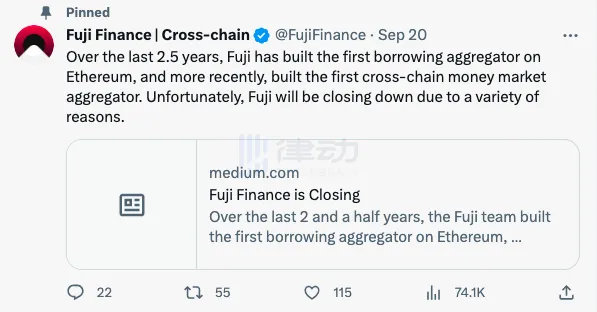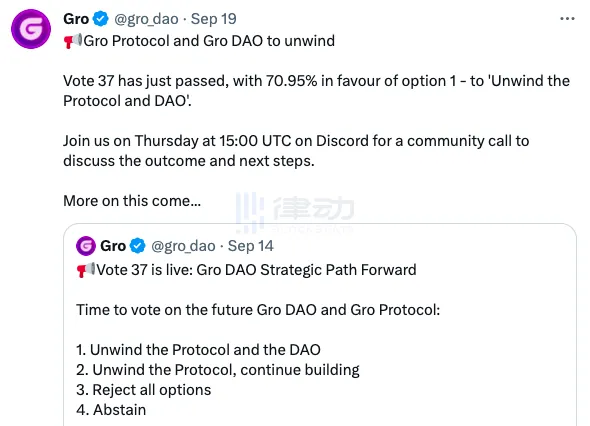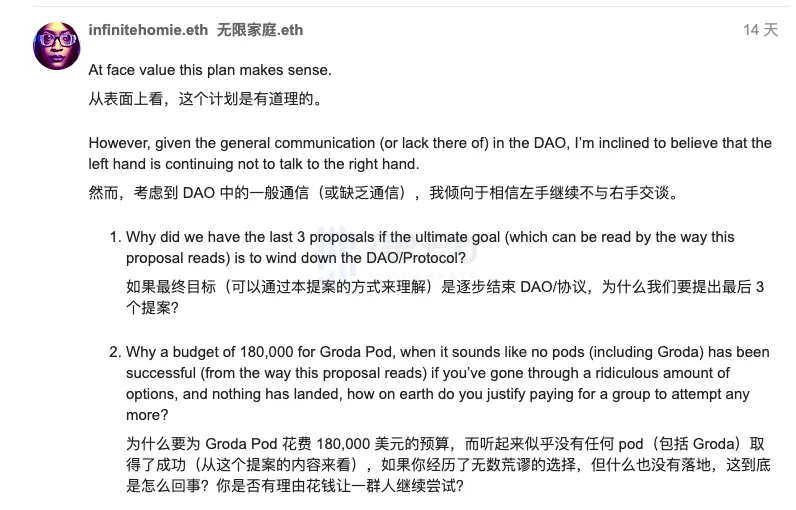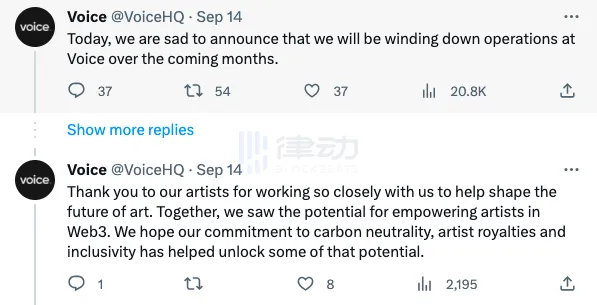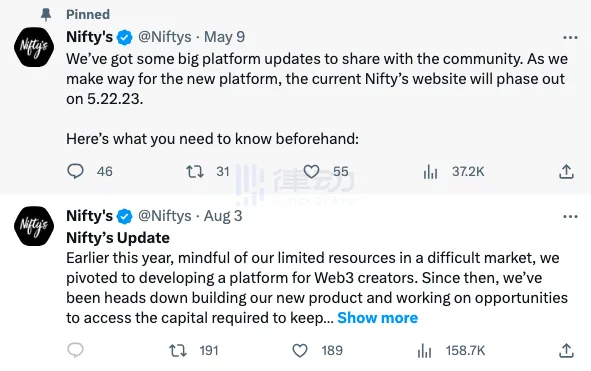Sorry, we failed. Multiple projects have been shut down one after another. Is the shutdown wave coming to the cryptocurrency industry?
Failure. Numerous projects being shut down consecutively. Is the shutdown wave hitting the cryptocurrency industry?Author: Sharon, BlockBeats
Editor: Jack, BlockBeats
Despite the lively Token2049 conference that just ended, the current situation of the cryptocurrency industry seems to be stuck in a quagmire, unable to shake off the overall downturn sentiment.
- Multiple projects announce shutdowns in succession, is the encryption industry ushering in a ‘shutdown wave’?
- Inventory of Binance Labs’ sixth season incubation projects
- 12 New Projects A Summary of Binance Labs’ Sixth Season Global Incubation Program
On September 21st, DeFi project Fuji Finance announced its cessation of operations, and users can withdraw funds through the user interface before 2024. This is the fourth project to announce its shutdown in September this year. Prior to this, there were also DeFi projects Gro Protocol on September 20th, DeFi and NFT trading robot None Trading on September 20th, and NFT platform Voice founded by BM, the founder of the public chain EOS.
According to incomplete calculations by BlockBeats, there were 9 projects, exchanges, and communities in the cryptocurrency industry that shut down in 2021, 17 in 2022, and the number increased to 27 in 2023. At the same time, in 2023, the speed of project shutdowns has been accelerating, from an average of 1 per month to a peak of 5 per month. Behind these events, from community operations to project financing, every participant in the cryptocurrency industry has felt the chill of the bear market.
Increasing Frequency of Project Shutdowns
Fuji Finance, as the “first DeFi aggregator” on Ethereum, is now closed, and like Gro Protocol, another DeFi project, the simple reason is lack of funds.
In its press release, Fuji Finance stated, “Since February of this year, the Fuji team has been raising funds to continue developing the protocol and building the future of cross-chain DeFi operations. We have been unable to find a market-fit product. As our funds continue to dwindle, we have decided that we need to start winding down the company and ceasing operations, and there is no sign of the fundraising activity ending at present.”
Gro Protocol on September 20th also stated, “Despite the incredible dedication, time, and resources contributed by all Gro DAO contributors and members to this community and protocol over the past three years, Gro DAO finds itself facing significant challenges. Difficult markets, underperformance of Gro Protocol, and key deviations of Groda Pod have put Gro DAO at a critical moment that requires decisions about its future.”
The decision is to shut down and dissolve, which also received a support rate of 70.95% within the community and will focus on dissolving the DAO and ceasing operations of Gro Protocol from October 3rd to January 3rd, with a budget of 180,000 USDC. Users can withdraw assets from GVT, PWRD, and Pools at any time (without time limit).
The official website of Gro DAO elaborates on the reasons for the project’s shutdown: firstly, the performance of the protocol – Gro, the flagship product of the DAO, has performed poorly for a long time; secondly, the departure of key management personnel (“leadership vacuum”), coupled with the failure of the expansion of other products such as Pod (LianGuainda), has triggered broader survival issues for the DAO.
Source: Gro DAO Governance
The departure of “4 key figures of Gro DAO, contributors, and community members” has also accelerated the process of the project’s dissolution. In response, there are doubts within the community about the allocation of funds in the proposal: “Why pay two people $170,000 to simplify the product?” On the other hand, some question the allocation of time and budget: “This is the worst proposal for time and budget reduction that I have ever seen.”
Source: Gro DAO Governance
Going back in time, Voice, the NFT social platform founded by EOS founder BM, announced its shutdown on September 14th, citing “high uncertainty in the cryptocurrency and NFT markets.” Voice was launched in June 2019, backed by Block.one, initially as a decentralized social platform, competing with Twitter (X), Facebook, and others. BM called it an “application that will change the industry landscape.”
At that time, Voice can be said to have been born with a silver spoon. In order to successfully launch and promote Voice, on the one hand, Block.one paid a $24 million fine to the SEC to prepare for the upcoming compliance of Voice; on the other hand, BM spent $30 million to purchase the domain name Voice.com, setting the record for the largest publicly disclosed domain name sale in history. BM believed it was “expensive but valuable.”
Despite high expectations, Voice did not live up to users’ expectations and received a lukewarm response from the community. In May 2021, Block.one announced the upgrade and transformation of Voice into an NFT-based creation and social platform targeting emerging creators, but now it cannot escape the fate of being shut down.
In addition, Nifty, the Web3 creator platform that announced its shutdown on August 3rd, also cited “insufficient funds” as the reason for the shutdown. On social media, they stated, “Earlier this year, considering our limited resources in a challenging market, we pivoted towards developing a platform for Web3 creators. Since then, we have been committed to developing new products and seeking opportunities to secure the funding needed to continue development. Unfortunately, despite our best efforts, the investment opportunities we have been working on have not materialized, and we now find ourselves at the end of the road.”
It can be seen that most of the projects that have announced suspension of operations in the past month are due to insufficient funds, which is also related to the current bear market. Recently, the PolkaWorld community has also suspended operations due to issues with funding allocation in proposals and new governance frameworks.
These projects rose during the bull market but exited during the bear market. Behind this mess lies the root cause of money.
Is the money all burned out?
Jocy, the founder of the crypto industry venture capital firm IOSG, recently wrote that for many teams, if the bear market does not end, then this (referring to Token2049) will be their last public appearance. (Related reading: “IOSG Founder’s Reflections After Token2049: The bull market still needs time, the toughest time has come”)
“LPs continuously support the early-stage VCs that promote industry growth, VCs continuously support founding teams in emerging tracks, and teams continue to expand and grow. It seems that everything is moving in a better direction. But in fact, this is not the case. For many teams, Token2049 is basically their last hope for a few more rounds of financing. If the bear market does not end, this could be their team’s last brand exposure because most early-stage teams have bottomed out their runway due to expansion in the past two years. Some teams have a very high burn rate, and in such a market, they only have 5-10 months left, or even they spare no effort to buy the sky-high-priced tickets/sponsorship booths of Token2049 to pitch to more potential investors.”
This also indicates to some extent that perhaps behind the recent announcements of project suspensions, the funds that were raised initially have now been burned out. And from the recent financing history of several projects, perhaps this is indeed the case. During the previous bull market, project financing was easy, and VCs were generous with their money.
In March 2021, Gro Protocol announced the completion of a $7.1 million seed round of financing. It is reported that this round of financing was led by Galaxy Digital and Framework Ventures, with participation from Variant, Northzone, Nascent, and others. In July 2021, Nifty’s announced the completion of a $10 million seed round of financing, with participation from Polychain Capital, Ethereal Ventures, Coinbase Ventures, A&T Capital, and others. Voice even received $150 million in financing from Block.one.
2021 was indeed during the bull market, and now that 2 years have passed, perhaps as Jocy said, the money that was raised back then has now been burned out. However, in the current bear market period, the resistance to raising funds for these projects has increased, and therefore it has become one of the reasons for their suspension and dissolution. But perhaps, as stated in the announcements of projects such as Nifty and Fuji, they have unwavering confidence in the industry’s development, but the current situation and conditions do have considerable “uncertainty”. Perhaps in the next cycle, these projects will come back to life and usher in a new summer.
We will continue to update Blocking; if you have any questions or suggestions, please contact us!
Was this article helpful?
93 out of 132 found this helpful
Related articles
- 12 New Projects Binance Labs’ 6th Season Global Incubation Program Projects Overview
- Overview of the 12 incubation projects in the sixth season of Binance Labs
- Quick look at the first batch of 24 selected projects for the Variant Founder Fellowship.
- Eclipse Mainnet Architecture Introduction Ethereum SVM L2
- Banana Gun Research Report How did this sniper rifle make its way to the top of the TG BOT queue?
- A comprehensive inventory of the top ten on-chain Rug Pull projects in the crypto community, mainly from the previous bull market.
- Big Brother Ma Ji Huang Licheng to Launch New Project? Overview of its Organizational Structure and Token Economics

